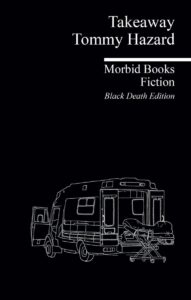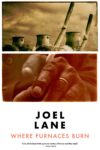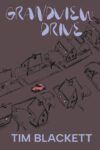
[Morbid Books; 2021]
If you were to take eighty pages and divide them with comedic spleen, which is equaled only by brutality, and one grand finale of etheric transcendence to boot – much like the angelic ascension of Scorsese’s Bringing Out the Dead – you’d have Tommy Hazard’s story collection, Takeaway. Lev Parker, the editor of Morbid Books, writes an introduction to the “Black Death Edition” (2021) reissue following its sold-out 2017 release. An excerpt: “Before you delve into the main text, I should warn you that Tommy Hazard does not predict the outbreak of a novel form of coronavirus. But his observations of the human condition – our propensity for groupthink, hysteria, contagious fear of death, and the fallibility of the medical profession – describe a society that was primed for this kind of catastrophe.”
Takeaway would be just as scathingly prescient in any time – although hooks are employed, cultural relevance is secondary. In a world hovered over a smartphone, checking the pulse of people’s Instagram stories to see if they’re still there, everyone locked inside a private phone booth believing connections exist, Hazard’s narratives hone in. Takeaway is a work of fiction narrated by Tommy Hazard, the nom de plume of an ambulance driver who worked in Hackney and Islington (London, UK) for over a decade. The book’s mood is cast on the first page: “A call comes down the radio, but anyone who’s been doing the job for any amount of time knows to ignore all the information except for the address. Because it’s always lies.” This is not a quip. Every message received over the phone or radio is a miscommunication, a piss-soaked thread leaking through this life (sometimes life’s semblance of art is astute). “All narratives are false narratives. / Including the one you are about to read,” as Parker writes in the intro. In one story, a teacher claims their student has both swallowed and is choking on a pen – anatomically impossible as the tubes going to the stomach and the lungs are separate, although the lie gets an ambulance to the school. While the front cover of the book is suggestive of death, featuring an ambulance with a body bag in front of it, drawn in a chalk white outline, this is slightly misleading. Takeaway is not corpse porn, it does not center death but life – and it is the narrative of a life well-lived.
During one of the strangest tales, Hazard accidently strikes a pregnant woman with his ambulance. She’s wearing all black and sprints through a crosswalk in the rain. Hazard, en route to a “Bleeding PV” (or post vagina, “If you’re bleeding out of your vagina it’s termed Bleeding PV . . . Ninety percent of the bleeding PV’s we go to are periods,” Hazard says) thinks blaring sirens will deter anyone from the crosswalk. He reports the incident to his managers. They ask how fast he was driving: “About 30mph,” he says. The manager replies: “If the senior managers find out you were driving so slowly you’ll get the sack.” What they’re really saying, it is concluded, is that instead of driving to a house in a manner where someone was most likely having their period and bumping a crosswalk patient, he “should have killed her.” The absurdity of this situation comes off as humorous in Hazard’s fictional world, but anyone in the workforce who’s experienced similar Kafkaesque bureaucracy knows that it’s enough to drive anyone who doesn’t sidestep it, the way Hazard does, insane.
Referring to people’s symptoms, Hazard says, “My mate Kev and I have become experts at reading this stuff and interpreting the information for what it really is.” In essence, they have “bullshit detectors” for fakers and hysterics; but on the flip side he admits that “sometimes there is no rational explanation for what happens inside the human body,” which is often the case with idiopathy. Certain personalities, like Hazard’s, strip the pretentious and intimidating veneer off a philosophy, off the cryptogenic nature of disease, relaying dense ideas with feather-light pertinacity.
An example of this is Hazard’s untangling of death and resuscitation. It is worth noting here an important and common thread of thought amongst the chronically sick – DNR (or Do Not Resuscitate), an acronym tattooed on my wife’s chest. The reason for this must be belabored for the tender-footed: maybe one’s last moments shouldn’t be prolonged with large tubes jammed down the throat, holes drilled in the knee, fluids pumped into the bone, the continuous breaking of the ribs and sternum – and this decision is a reality for many. Hazard understands this, explaining the theory quite well to a family who is sure that their mom is in cardiac arrest, even though her heart is beating and she’s breathing. The family begs him to “do something”. He tells them to be glad that he doesn’t have to. Hazard explains to the family, “Only five percent of people come back when we do CPR . . . Out of that, how many actually have a quality of life? A tiny amount.” In the story, Hazard picks up his bag and leaves the family, but continues his speech for the readers, “As you’re going through that dying process your head is most likely producing some psychedelic drug and you might see a tunnel of light or the gates of heaven. Imagine you’re going through that relatively blissful drug experience and some fucking cunt starts trying to reverse it . . . This is fucking brutal, and I feel sorry for the people for whom this is their last experience on this planet.” In this story, and many others in Takeaway, Hazard’s patients’ common sense, sourced through medical objectivity or personal experience, is trumped by their pervasive fear of death.
Takeaway not only details the intricacies and intimacies of medicine, but of labor in general. So often in the workforce, as is the case with Hazard and his ambulance crew, the values that management hold dear are irrelevant for those on the ground. “The obsession with details that don’t matter,” Hazard says, “and a denial of really important details,” creates absurdity. Hazard tangos beautifully outside these bureaucratic figure eights, not only because he understands how far the rules can bend, but because he’s “stopped thinking in terms of scary or pleasurable” – his advice to a new crew member. Hazard’s character deals in life and death and knows that judgement calls, not rules, is how you get good at the job – not just through the lens of his management but, like it or not, of his citizenry as well.
My takeaway from Takeaway? Be kind to the uniform hovering above you before you die. You might be leaving, but they can’t clock out just yet. Remember, your fellow retch needs help reaching the other side, too.
David Kuhnlein’s writing is featured in 3:AM Magazine, Entropy, DIAGRAM, Bright Lights Film Journal, Juked, tragickal, and others. He edits the literary review column Torment, venerating pain and illness, at The Quarterless Review. He lives in Michigan. His website is at https://davidkuhnlein.wordpress.com/
This post may contain affiliate links.







